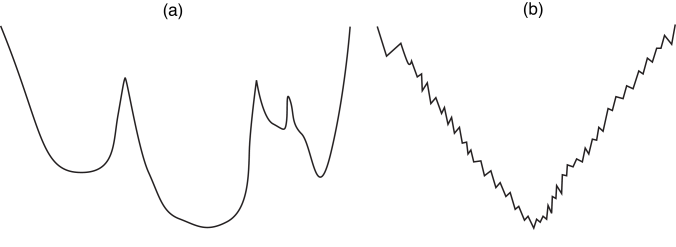Artificial
Intelligence 2E
foundations of computational agents
The third edition of Artificial Intelligence: foundations of computational agents, Cambridge University Press, 2023 is now available (including full text).
4.7.2 Randomized Algorithms
Iterative best improvement randomly picks one of the best possible successors of the current assignment, but it can get stuck in local minima that are not global minima.
Randomness can be used to escape local minima that are not global minima in two main ways:
-
•
random restart, in which values for all variables are chosen at random. This lets the search start from a completely different part of the search space.
-
•
random walk, in which some random steps are taken interleaved with the optimizing steps. With greedy descent, this process allows for upward steps that may enable random walk to escape a local minimum that is not a global minimum.
A random walk is a local random move, whereas a random restart is a global random move. For problems involving a large number of variables, a random restart can be quite expensive.
A mix of iterative best improvement with random moves is an instance of a class of algorithms known as stochastic local search.

Unfortunately, it is very difficult to visualize the search space to understand what algorithms work because there are often thousands or millions of dimensions, each with a discrete, or even continuous, set of values. Some intuitions can be gleaned from lower-dimensional problems. Consider the two one-dimensional search spaces in Figure 4.8, where the objective is to find the minimum value. Suppose that a possible successor is obtained by a small step, either left or right of the current position. To find the global minimum in the search space (a), one would expect the greedy descent with random restart after a local optimum has been found to find the optimal value quickly. Once a random choice has found a point in the deepest valley, greedy descent quickly leads to the global minimum. One would not expect a random walk to work well in this example, because many random steps are required to exit one of the local, but not global, minima. However, for search space (b), a random restart quickly gets stuck on one of the jagged peaks and does not work very well. However, a random walk combined with greedy descent enables it to escape these local minima. A few random steps may be enough to escape a local minimum. Thus, one may expect that a random walk would work better in this search space. Because it is difficult to determine which method would work best from examining the problem, practitioners will evaluate many methods to see which one works well in practice for the particular problem. It is even possible that different parts of the search space have different characteristics.


